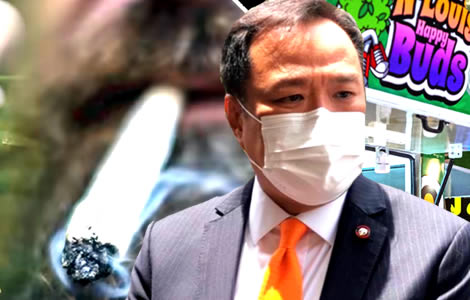Bullish Anutin, this week, argued that social problems caused by his campaign to decriminalise marijuana were negligible and even pointed to a provision in the new Cannabis Act which could see recreational use of the drug fully legalised by a parliamentary amendment in the future although some of his most senior officials within the Ministry of Public Health are on record in forceful opposition to such a move and even the current free for all where secondary laws and regulations are being used to enforce minimal controls that allow the drug to be sold on the street.
Thailand’s Minister of Health Anutin Charnvirakul has revealed that the Cannabis Act, a law promised in parliament last July to regulate and control the use of cannabis following a free for all since June 9th last with only the use of secondary laws and ministerial regulations to protect the public from smoke and other effects, can, at some future point, be used to usher in a new era of open recreational use of the drug in the kingdom by amendment through a committee. It comes as the minister, responsible for pushing what appears to be a conflicting or opaque government policy, also warned this week that foreign tourists seeking to smoke marijuana freely in the kingdom were not welcome.

Basking in the portrayal of his signature cannabis policy as a first for Asia this week at a Meet the Press event themed ‘Cannabis, Hemp for medical and economic benefits,’ the minister chose to focus on the economic benefits, a key reason cited in a recent National Institute of Development Administration (NIDA) opinion poll for why a majority of the public in Thailand support his cannabis policy while, at the same time, his response to the 72% of people who have expressed concern or unease about the negative medical impact of the drug on the public, is to point towards the facts that its recreational use in Thailand is still illegal under public health regulations and secondary laws.
This week, Minister Anutin hailed interest from Malaysia’s Health Minister in Thailand’s programme to legalise cannabis for medical use as a justification for his Bhumjaithai Party’s policy on decriminalising the drug which came to a head after June 9th last when marijuana ceased to be classified as an illegal narcotic for criminal law purposes.
Minister explains the misuse of marijuana will be prosecuted to allow for the drug to benefit the country
‘People should not underestimate this policy. We have done everything possible to ensure that misuse of marijuana is illegal and will be prosecuted. We believe that everything can be controlled like now. This policy can then be positively driven and will create many benefits for the country,’ he told reporters.
At the same time, he warned that Thailand was not interested in foreign tourists visiting the kingdom to be able to freely smoke marijuana or cannabis.
‘We don’t welcome those kinds of tourists,’ Minister Anutin declared as he told the media that foreign tourists came to Thailand for its culture and its intrinsic beauty.
He told reporters that Thailand will see revenues of ฿28 billion from the drug this year and that this will climb to at least ฿50 billion in the short term.
Government policy does not promote the recreational use of cannabis, minister assured parliament in July
Just weeks after assuring lawmakers in parliament following stinging criticism from the opposition over the chaos and confusion concerning cannabis since its decriminalisation and serious concern being openly and vociferously expressed by the medical community, the minister suggested this week that recreational use of the drug may also be legalised going forward.
Mr Anutin, in July, assured MPs in parliament that his party’s policy and that of his ministry did not include the promotion of recreational cannabis use.
On Wednesday, he told reporters that there had been a reported 60 hospital admissions linked with the drug recorded from June 9th last to August 16th and that there were no signs of social problems associated with it.
The minister emphasised that the number of people admitted to hospital was quite negligible amongst a population of 70 million.
At the same time, he promised action to control abuses of cannabis under the country’s public health laws and other legal measures.
A key parliamentary committee is currently reviewing a law to purportedly regulate and control the use of marijuana or cannabis in Thailand for purposes other than medical or health use.
New cannabis law promised at the start of the year when the cabinet greenlighted the sweeping change
This law was promised earlier in the year, after the cabinet approved the latest move on the drug, by government legal advisor and Deputy Prime Minister Wissanu Krea-ngam as a response to the delisting of cannabis as a controlled or illegal substance in June for Thailand to comply with its commitments under key UN treaties to control and restrict the abuse of the substance.
In July, the minister himself while addressing a censure debate in parliament and widespread criticism from Thai medical professionals who unequivocally oppose the extended nature of the kingdom’s new cannabis policy outside of allowing cannabis for medical use, affirmed that the recreational use of the drug will again be criminalised and was not part of the government’s policy.
Before this, 851 doctors and medical professionals at Ramathibodi Hospital in Bangkok, in a letter and campaign organised by Dr Smith Srisont, the President of the Forensic Physician Association of Thailand (FPAT) called for nothing less than a reversal of the minister’s policy and actions that came into force on June 9th which led to the decriminalisation of the drug and nationwide order for the Royal Thai Police to stand down prosecution activity for an array of offences.
New bill being processed toward a second reading in parliament does not appear to stop the current liberalisation of the drug in its tracks
The legislative campaign to decriminalise cannabis has been confusing and opaque with all eyes now on the bill being processed through parliament.
The new bill does not appear to put a halt to the trend seen since June 9th by bringing an end to the open sale of cannabis products in public and the free use of the drug for recreational purposes.
Indeed, this week, the minister told reporters that there is no urgent need for the bill to regulate the use of cannabis as it was already being achieved.
‘All regulations we have already implemented are enough for control measures, even without the cannabis law,’ Minister Anutin disclosed.
The situation is very much like Thailand’s electoral reform law which was only passed last week in its original form by parliament due to a lack of a quorum, leaving the basis for Thailand’s next General Election still uncertain.
The new legislation, known as the Cannabis Act is expected to be perfected by parliament this month and is being examined and deliberated upon by a panel led by Mr Supachai Jaisamut, a veteran politician of the Bhumjaithai Party led by the deputy prime minister and minister of public Health.
Bill allows for recreational use in the future
Minister Anutin has also made what appears to be confusing statements even this week about the ongoing campaign being led by his ministry, whose key officials have come out strongly in vocal opposition to the recreational use of cannabis.
In a concession this week, he said that the new bill being passed through parliament has an opening to do just that in the future.
Amendment in parliament through a committee can usher in a new era of legal recreational use of the drug once the public understands it, Anutin said
He highlighted that while the current legislation before parliament and other provisions make the recreational use of cannabis illegal, a provision was contained within the law where an amendment to it can be made through a committee process to make the use of cannabis for recreational purposes legal at a point when the public comes to see that the drug is not harmful.
‘We are ready to achieve that point if people have a better understanding of how to use it correctly,’ he told the media. ‘I would say some negative cases appeared on the news that are very dramatic, such as cannabis use in schools or cannabis smells in public places. We have a law to control it under the public health law and the authorities have full right to take legal action against culprits.’
Polls show widespread use nationwide of marijuana for recreational use with 10% of the public using the drug for this reason and only 7% for medical use
Doctors and medical experts pointed out that the government’s decriminalisation of the drug has resulted in the widespread use of cannabis or marijuana throughout Thailand despite the practice being still technically illegal under sundry provisions such as public health regulations.
Currently widespread use of marijuana nationwide for recreational purposes with opinion polls showing 10% of the public use marijuana for this purpose while 7% use it for medical purposes.
At the end of July, the National Police Commissioner, General Suwat Jangyodsuk through a spokesman let it be known that police were seeking clarification of older legal provisions after being requested by the permanent secretary at the Ministry of Public Health, Narong Saiwong, to enforce stricter sanctions against recreational cannabis users under the Traditional Medicine Wisdom Protection and Promotion Act (1999).
Under the secondary provisions that are not being uniformly enforced, it is still illegal to smoke cannabis or marijuana publicly in Thailand with the penalty being three months imprisonment and a fine of ฿25,000.
Law already makes a cannabis high illegal
Furthermore, the new law introduced by Mr Anutin’s Ministry of Public Health make any part of the cannabis plant which is priced for consumption or sale with a THC (tetrahydrocannabinol) more than 0.2% whether this be in either medicine, food or processed part of the plant prepared for recreational use.
Most cannabis products sold for users to get a recreational high have a THC (tetrahydrocannabinol) value of 25% to 40% as the quality of cannabis in the last ten years has jumped significantly.
This is another grey legal area later to be defined over what should be defined as a product of a cannabis plant.
Strong opposition from doctors, medical experts in Thailand, around the world and within the Ministry of Public Health to the recreational use of pot
In the meantime, doctors and medics in Thailand and around the world continue to warn about the very real dangers of cannabis to the mental and physical health of those who consume it.
The most recent study, a definitive one linking mental health issues with users of the drug was published at the end of July in The Lancet Psychiatry.
The Lancet heralds a study as the first systematic review showing a link with mental health issues
This is in addition to widespread concern among Thai medical practitioners such as Associate Professor Dr Suriyadeo Tripathi, a former National Institute for Child and Family Development Director and now Director of the Centre for Morality Promotion who warns of the long-term effects on younger people even though the current legislation and ministerial regulations prohibit the use of the drug by those under the age of 20 years of age.
‘Children should not consume cannabis in any form because this will have long-term effects,’ Dr Suriyadeo explained. ‘Moreover, some youngsters may be allergic to the plant, which could damage their respiratory and cognitive thinking processes.’
Thai Health Ministry chief says cannabis should only be used for medical purposes under prescription
These views are echoed and indeed amplified by Dr Somsak Akksilp, the Director-general of the Department of Medical Services within Mr Anutin’s Ministry of Public Health.
Marijuana revolution and overdoses raise concern with calls for action to outlaw recreational use
Dr Somsak believes that cannabis should only be used for medical purposes and then only on a prescription basis.
‘Cannabis impacts on the brain and the nervous system and especially with students, whose brain and learning capability will be affected,’ Dr Somsak explained. ‘We know the pros well, but the cons include addiction and traffic accidents involving drivers under the influence. This already happens in other countries.’
Details and provisions of the long-awaited Cannabis Act outlined by committee spokesman on Thursday
In the meantime, details of the new Cannabis Act being processed through parliament are being carefully examined even though Minister Anutin has already highlighted that the law can be a trojan horse which will later be used to clear the way for the recreational use of the drug by parliament in the future.
Parnthep Pourpongpan, a spokesman for the committee vetting its provisions just before the second reading in parliament, highlighted the following provisions of the long-awaited cannabis law on Thursday.
Under Section 18 of the law, the public can grow up to 15 plants by simply registering with authorities to do so without any fee.
Under Section 15 those who grow and process marijuana plants for commercial purposes must seek a permit for doing so. Small-time operators under this provision will be growers with land under cultivation of less than 5 rai.
Failure to obtain a permit will see a penalty of up to one-year imprisonment and a fine of ฿100,000 while larger operators committing the same offence will face a three-year jail term and a fine of ฿300,000.
It will be illegal to export marijuana or cannabis and a jail term of up to 5 years can result for committing this offence. It is already illegal to import the drug under customs regulations.
Those working with pot in Thailand commercially must be Thai nationals or entities controlled by Thais, vending machines and online advertising banned
Those working with cannabis or marijuana on a commercial basis must be Thai nationals and any company or entity associated with such a venture must be controlled by Thai nationals aged over 20 years of age.
The law, under Section 28, outlaws the use of vending machines to sell cannabis or advertising a range of cannabis products online such as buds, hashish, extracts from the plant and equipment or devices used to smoke the drug.
The same provision outlaws false or exaggerated adverts for pot with all offences caring a penalty of up to one-year imprisonment or a fine of ฿100,000.
Opposition from the Islamic community
The current rise of cannabis and marijuana use in Thailand has drawn condemnation from southern Islamic groups.
Muslim community opposes cannabis use, Islamic leaders in 5 key provinces on Monday promised an all-out campaign through 300 mosques to oppose it
Religious leaders in five Muslim-dominated provinces in the south of the country, Songkhla, Yala, Pattani, Narathiwat and Satun, have highlighted a plan to launch a campaign of opposition to the legalisation of cannabis as a recreational drug.
Foreign Embassies rush to clarify matters for foreign tourists to Thailand both as to the law in the kingdom and concerns returning home through airports
There has also been a reaction from foreign embassies to prospective tourists to Thailand urging them to be aware of the legal situation which is that public use of the drug remains illegal but that it now appears to be legal to consume the drug in private or controlled areas.
At the same time, Singapore’s Embassy in Thailand has warned travellers arriving from Thailand to be careful not to be carrying any marijuana or cannabis-related substances when they arrive at Changi Airport.
The city-state with its draconian laws including the death penalty which is regularly enforced for serious drug-related offences issued a warning through the Central Narcotics Bureau (CNB).
A statement from the law enforcement body made it clear that checks are regularly conducted at various checkpoints while also alerting Sinaporaeans and residents in the city that consuming drugs outside of Singapore’s borders is still a crime in the country.
Singapore warns its citizens that smoking marijuana in Thailand is still illegal under City State’s laws
‘The Misuse of Drugs Act means that any Singapore citizen or permanent resident found to have consumed controlled drugs outside Singapore will also be liable for the drug consumption offence,’ the advisory warned.
As Chinese tourists have just begun returning to Thailand, the Chinese Embassy in Bangkok also has a severe warning posted online for its citizens which alludes to the lack of clarity in Thailand’s law at this moment.
‘There are no clear rules on whether foreign citizens can apply to grow cannabis in Thailand. It should be remembered that the Thai government still strictly manages the cannabis industry. The use of cannabis and its products must be based on health and medical reasons rather than recreational purposes,’ a notice reads. ‘Article 357 of the ‘Criminal Law of the People’s Republic of China’ clearly stipulates that cannabis is a drug, and it is illegal to cultivate, possess, and consume cannabis in China. Tetrahydrocannabinol belongs to the first category of psychoactive drugs under control in China, namely drugs, and various products containing tetrahydrocannabinol are not allowed to be brought into China. It is a criminal offence to carry cannabis or cannabis products into China.’
Join the Thai News forum, follow Thai Examiner on Facebook here
Receive all our stories as they come out on Telegram here
Follow Thai Examiner here
Further reading:
Recreational use of pot to be recriminalised as Minister warns abuses are undermining his plan
Warnings as fears grow over recreational cannabis use as Thai man is left impotent by self-harm act
Marijuana revolution and overdoses raise concern with calls for action to outlaw recreational use
Legal pot does not appear to be working for Anutin’s Bhumjaithai Party in latest opinion poll
One of the biggest drug dealers in the South flees home as Thai police and army move against him
Thai man burns down his family home: Thailand’s drugs problem is still a very real threat to society
UK man arrested on drugs charges by CSD police in Pattaya claims ex Thai wife set him up
UK drug dealers living it up in Thailand to be deported back to the UK after arrests in Pattaya
Italian living with Thai wife on Koh Phangan arrested for dealing after drugs found in the post
UK drug dealers living it up in Thailand to be deported back to the UK after arrests in Pattaya
Kiwi taken into custody on drug charges in Chiang Mai after police raided his bar and restaurant
Double life of a UK man who became a drug dealer in Udon Thani
UK man watched his ceiling as a downpour of money spelled his downfall and jailing in Thailand


















